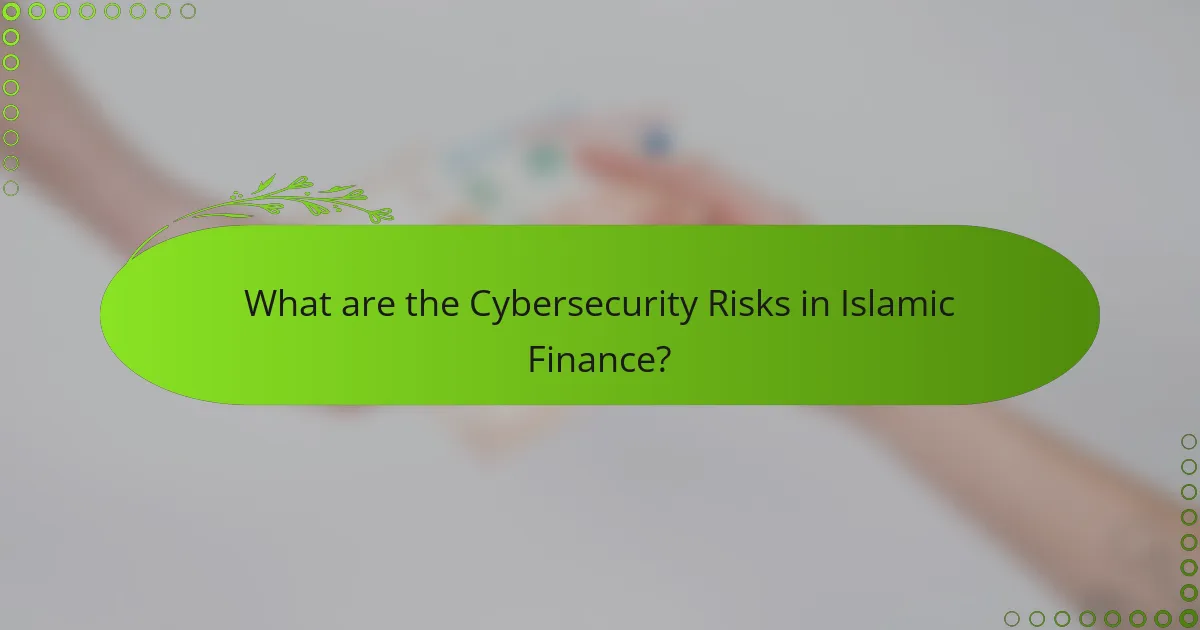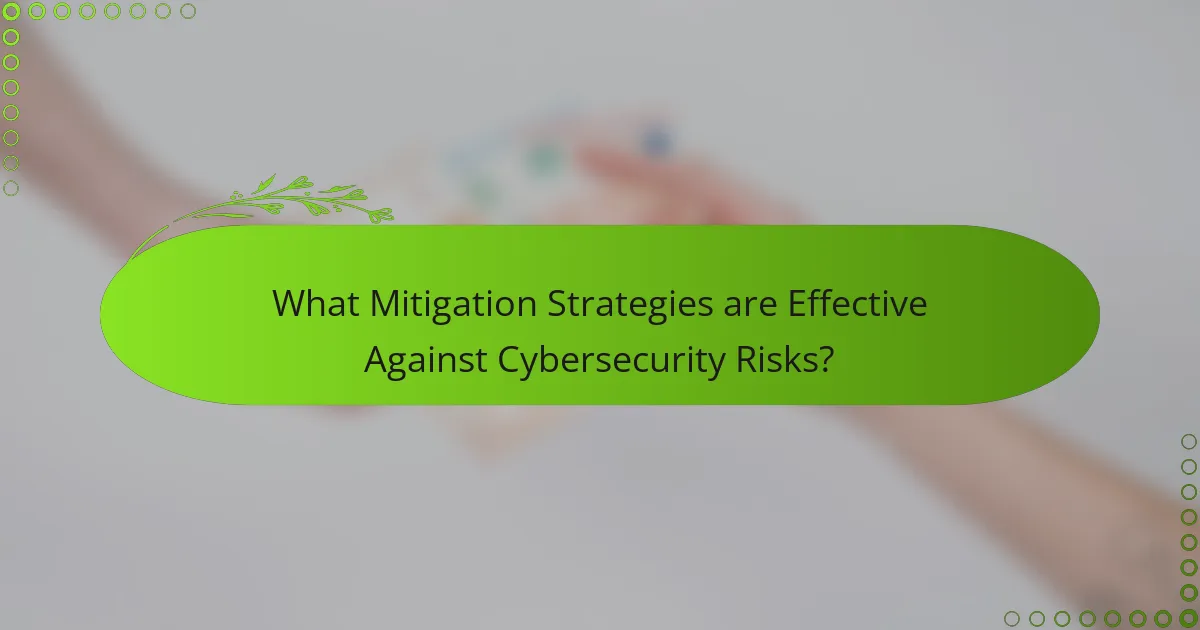
What are the Cybersecurity Risks in Islamic Finance?
Cybersecurity risks in Islamic finance include data breaches, fraud, and regulatory non-compliance. These risks arise due to the sensitive nature of financial transactions and personal information involved. Islamic finance institutions often face targeted cyberattacks due to their unique operational frameworks. The reliance on digital platforms increases vulnerability to phishing and malware attacks. Additionally, the lack of robust cybersecurity measures can lead to financial losses and reputational damage. Regulatory compliance issues may also arise if institutions fail to protect customer data adequately. The evolving landscape of cyber threats necessitates continuous monitoring and adaptation of security protocols in Islamic finance.
How do cybersecurity risks specifically impact Islamic financial institutions?
Cybersecurity risks significantly impact Islamic financial institutions by threatening their operational integrity and customer trust. These institutions often handle sensitive financial data and adhere to Shariah compliance, making them attractive targets for cyberattacks. A successful breach can lead to financial losses, legal consequences, and reputational damage. According to a report by the Financial Stability Board, the financial sector faces increasing cyber threats, with Islamic banks being particularly vulnerable due to their reliance on technology for digital banking. Furthermore, the unique principles of Islamic finance, such as risk-sharing and ethical investing, complicate their response to cybersecurity incidents. This dual challenge necessitates robust cybersecurity measures to protect assets and comply with regulatory frameworks.
What types of cyber threats are most prevalent in Islamic finance?
The most prevalent cyber threats in Islamic finance include phishing attacks, ransomware, and data breaches. Phishing attacks target employees to steal sensitive information. Ransomware encrypts data, demanding payment for access. Data breaches expose confidential financial information, undermining trust. According to a report by the Islamic Financial Services Board, these threats have increased due to the sector’s digital transformation. The report highlights a 30% rise in cyber incidents in the last year. These threats pose significant risks to Islamic financial institutions and their clients.
How do these threats differ from those in conventional finance?
Cybersecurity threats in Islamic finance differ from those in conventional finance primarily due to the unique principles and operational frameworks of Islamic financial institutions. Islamic finance is governed by Sharia law, which introduces specific ethical guidelines and compliance requirements. These principles can lead to distinct vulnerabilities, such as threats targeting Sharia-compliant products and services.
For instance, the prohibition of interest (riba) necessitates alternative financial structures that may be more complex, making them attractive targets for cybercriminals. Additionally, Islamic finance often involves partnerships and profit-sharing arrangements, which can expose sensitive data to more parties than traditional finance models.
Moreover, Islamic financial institutions may face threats related to the misuse of religious sentiments, where attackers leverage trust in religious compliance to execute phishing scams or fraud. A report by the International Monetary Fund highlights that the unique operational models of Islamic finance can lead to increased risks in cybersecurity.
Thus, the convergence of ethical guidelines, complex financial structures, and heightened trust dynamics creates a distinct landscape of cybersecurity threats in Islamic finance compared to conventional finance.
Why is understanding these risks crucial for stakeholders?
Understanding cybersecurity risks is crucial for stakeholders in Islamic finance because it directly impacts their operational integrity. Stakeholders face potential financial losses from data breaches, which can undermine trust and lead to diminished client relationships. In 2020, the average cost of a data breach was $3.86 million, according to IBM. Additionally, regulatory compliance failures can result in hefty fines and legal repercussions. For example, the GDPR imposes fines of up to 4% of annual global turnover for non-compliance. Awareness of these risks enables stakeholders to implement effective mitigation strategies, enhancing the overall security posture of their institutions. This proactive approach protects assets and ensures compliance with evolving regulations.
What are the potential consequences of ignoring cybersecurity in Islamic finance?
Ignoring cybersecurity in Islamic finance can lead to significant financial losses and reputational damage. Cyberattacks can compromise sensitive customer data, resulting in financial fraud. This may lead to loss of trust among clients and stakeholders. Regulatory penalties may also be imposed for non-compliance with data protection laws. Additionally, operational disruptions can occur, affecting service delivery. Affected institutions may face increased costs related to incident response and recovery. Long-term effects can include diminished market competitiveness and customer loyalty. Overall, the consequences highlight the critical need for robust cybersecurity measures in Islamic finance.
How can stakeholders ensure the integrity of Islamic financial transactions?
Stakeholders can ensure the integrity of Islamic financial transactions by adhering to Shariah compliance. This involves following principles that prohibit interest and promote ethical investing. Regular audits by Shariah boards can verify compliance with these principles. Implementing robust cybersecurity measures protects sensitive financial data. Training staff on ethical practices enhances awareness of compliance issues. Utilizing blockchain technology can provide transparency and traceability in transactions. Regulatory frameworks must be established to enforce compliance and address violations. These measures collectively contribute to maintaining the integrity of Islamic financial transactions.

What Mitigation Strategies are Effective Against Cybersecurity Risks?
Effective mitigation strategies against cybersecurity risks include implementing strong access controls, conducting regular security audits, and providing employee training. Strong access controls limit unauthorized access to sensitive data. Regular security audits identify vulnerabilities in systems and processes. Employee training raises awareness about phishing attacks and safe online behavior. Additionally, deploying firewalls and intrusion detection systems helps monitor and protect networks. Using encryption for data protection ensures that sensitive information remains secure. Finally, developing an incident response plan prepares organizations to respond swiftly to breaches. These strategies collectively enhance the cybersecurity posture of organizations, particularly in sensitive sectors like Islamic finance.
How can Islamic financial institutions implement robust cybersecurity measures?
Islamic financial institutions can implement robust cybersecurity measures by adopting a multi-layered security approach. This includes employing advanced encryption techniques to protect sensitive data. Regular security audits and vulnerability assessments are essential to identify potential weaknesses. Training employees on cybersecurity best practices enhances awareness and reduces human error. Implementing strong access controls ensures that only authorized personnel can access critical systems. Collaborating with cybersecurity experts can provide additional insights and solutions tailored to specific threats. Finally, adhering to regulatory compliance standards strengthens the overall security framework. Each of these measures helps safeguard against increasing cyber threats in the financial sector.
What specific technologies can enhance cybersecurity in Islamic finance?
Blockchain technology can enhance cybersecurity in Islamic finance. It provides a decentralized and immutable ledger for transactions. This reduces the risk of fraud and data tampering. Encryption technologies protect sensitive financial data during transmission and storage. Multi-factor authentication adds an extra layer of security for user access. Artificial intelligence can detect and respond to threats in real-time. Machine learning algorithms analyze patterns to identify anomalies. Regular security audits and [censured] testing can identify vulnerabilities. These technologies collectively strengthen the cybersecurity framework in Islamic finance.
How can employee training contribute to risk mitigation?
Employee training can significantly contribute to risk mitigation by enhancing awareness and skills related to cybersecurity. Training programs educate employees about potential threats such as phishing, malware, and social engineering. This knowledge empowers staff to recognize and respond to suspicious activities effectively.
Furthermore, regular training updates ensure that employees stay informed about the latest cybersecurity trends and best practices. A study by the Ponemon Institute found that organizations with comprehensive security awareness training programs experienced 70% fewer security incidents.
Additionally, well-trained employees are more likely to adhere to security protocols and policies, reducing the likelihood of human error. By fostering a culture of cybersecurity, organizations can strengthen their overall defense against cyber threats.
What role does collaboration play in strengthening cybersecurity?
Collaboration plays a crucial role in strengthening cybersecurity. It enhances information sharing among organizations. This sharing leads to a collective defense against cyber threats. For instance, organizations can share threat intelligence in real-time. According to a report by the World Economic Forum, collaborative efforts can reduce response times to incidents. Additionally, partnerships between public and private sectors improve resource allocation. Collaborative frameworks also foster innovation in security technologies. A study by the Ponemon Institute found that organizations with strong collaboration experience fewer data breaches. Overall, collaboration is essential for a robust cybersecurity posture.
How can Islamic finance institutions collaborate with cybersecurity experts?
Islamic finance institutions can collaborate with cybersecurity experts by engaging in joint risk assessments. This collaboration allows for the identification of specific vulnerabilities within financial systems. Cybersecurity experts can provide tailored solutions to address these vulnerabilities. Regular training sessions can enhance the knowledge of staff regarding cybersecurity threats. Furthermore, developing incident response plans in partnership ensures quick action during potential breaches. Sharing threat intelligence helps both parties stay updated on emerging risks. Collaborations can also include co-developing secure financial products that comply with regulatory standards. Such partnerships ultimately strengthen the overall cybersecurity posture of Islamic finance institutions.
What partnerships can be formed to share threat intelligence?
Partnerships can be formed between financial institutions, cybersecurity firms, and government agencies to share threat intelligence. Financial institutions can collaborate with cybersecurity firms to enhance their security measures. These partnerships can facilitate the exchange of real-time threat data. Government agencies can provide regulatory guidance and support in threat intelligence sharing. Industry consortia can also be established to foster collaboration among multiple stakeholders. Research shows that sharing threat intelligence can reduce response times by up to 50%. This demonstrates the effectiveness of partnerships in improving cybersecurity resilience.

What are the Regulatory Compliance Requirements in Islamic Finance?
Regulatory compliance requirements in Islamic finance include adherence to Shariah law, which prohibits interest (riba) and promotes risk-sharing. Financial institutions must establish Shariah boards to ensure transactions align with Islamic principles. Compliance also involves following local and international regulations, such as anti-money laundering (AML) and counter-terrorism financing (CTF) laws. Institutions must conduct regular audits to assess compliance with both Shariah and regulatory standards. Additionally, transparency in financial reporting is essential for maintaining trust and integrity. These requirements are enforced by regulatory bodies, which may vary by jurisdiction.
What regulations govern cybersecurity in Islamic finance?
Regulations governing cybersecurity in Islamic finance include guidelines from various authorities. The Central Bank of Malaysia, for instance, has issued the “Risk Management in Technology” policy. This policy outlines expectations for financial institutions regarding cybersecurity measures. The Islamic Financial Services Board (IFSB) also provides standards that address risk management related to technology. Additionally, the Basel Committee on Banking Supervision emphasizes the importance of cybersecurity in its guidelines. These regulations aim to protect sensitive financial data and ensure compliance with Sharia principles.
How do these regulations differ by jurisdiction?
Regulations regarding cybersecurity in Islamic finance differ significantly by jurisdiction. Each country has its own legal framework and standards for cybersecurity. For instance, Malaysia’s regulatory body, Bank Negara Malaysia, has specific guidelines tailored for Islamic financial institutions. In contrast, the United Arab Emirates has enacted the National Cybersecurity Strategy, which applies broadly across all sectors, including finance. Additionally, the European Union implements the General Data Protection Regulation (GDPR), which affects Islamic finance entities operating within its member states. These differences reflect varying national priorities, legal traditions, and risk assessments related to cybersecurity. Each jurisdiction’s regulations are designed to address specific threats and compliance requirements relevant to its financial landscape.
What are the implications of non-compliance for Islamic financial institutions?
Non-compliance for Islamic financial institutions can lead to significant legal and financial repercussions. Regulatory bodies may impose fines and sanctions for violations of Sharia law and financial regulations. This non-compliance can damage the institution’s reputation, leading to loss of customer trust. A decline in customer confidence can result in decreased business and revenue loss. Additionally, non-compliance may expose institutions to increased cybersecurity risks. Data breaches and information leaks can occur, further compounding financial losses. Ultimately, non-compliance undermines the integrity and stability of the financial system.
How can institutions ensure compliance with cybersecurity regulations?
Institutions can ensure compliance with cybersecurity regulations by implementing comprehensive security policies. These policies should align with relevant laws and frameworks, such as GDPR or NIST. Regular risk assessments are critical for identifying vulnerabilities. Training employees on cybersecurity best practices enhances awareness and reduces risks. Additionally, maintaining an incident response plan prepares institutions for potential breaches. Regular audits and assessments help verify adherence to regulations. Utilizing encryption and secure access controls protects sensitive data. Lastly, staying updated on regulatory changes ensures ongoing compliance.
What best practices should be adopted for regulatory compliance?
Adopting best practices for regulatory compliance involves implementing comprehensive policies and procedures. Organizations should conduct regular risk assessments to identify vulnerabilities. Training employees on compliance requirements is essential. Maintaining accurate documentation of compliance efforts is crucial. Regular audits help ensure adherence to regulations. Establishing a clear reporting mechanism for compliance issues promotes accountability. Engaging with regulatory bodies can provide guidance and updates on compliance standards. These practices help organizations mitigate risks and maintain regulatory adherence.
How can audits and assessments improve compliance efforts?
Audits and assessments enhance compliance efforts by identifying gaps in adherence to regulations. They provide a systematic review of policies and procedures. This process ensures that organizations meet legal and regulatory requirements. Regular audits can detect weaknesses in cybersecurity measures. Assessments help in evaluating the effectiveness of current compliance programs. They offer a framework for continuous improvement and risk management. Studies show that organizations conducting regular audits experience fewer compliance violations. This proactive approach ultimately reduces the risk of penalties and enhances overall security posture.
What practical steps can Islamic financial institutions take to enhance cybersecurity?
Islamic financial institutions can enhance cybersecurity by implementing multi-factor authentication. This adds an extra layer of security beyond just passwords. Regular security audits can identify vulnerabilities within systems. Training employees on cybersecurity best practices reduces human error. Developing an incident response plan prepares institutions for potential breaches. Utilizing encryption protects sensitive data during transmission. Collaborating with cybersecurity firms brings in specialized expertise. Adopting regulatory compliance frameworks ensures adherence to best practices. These steps collectively strengthen the cybersecurity posture of Islamic financial institutions.
The main entity of this article is cybersecurity risks in Islamic finance. The article outlines the various threats faced by Islamic financial institutions, including data breaches, fraud, and regulatory non-compliance, which arise from their unique operational frameworks and reliance on digital platforms. It discusses the specific impacts of these risks on operational integrity and customer trust, as well as the prevalence of cyber threats such as phishing and ransomware. Additionally, the article emphasizes the importance of robust mitigation strategies, regulatory compliance, and collaboration with cybersecurity experts to enhance security measures and ensure the integrity of financial transactions.